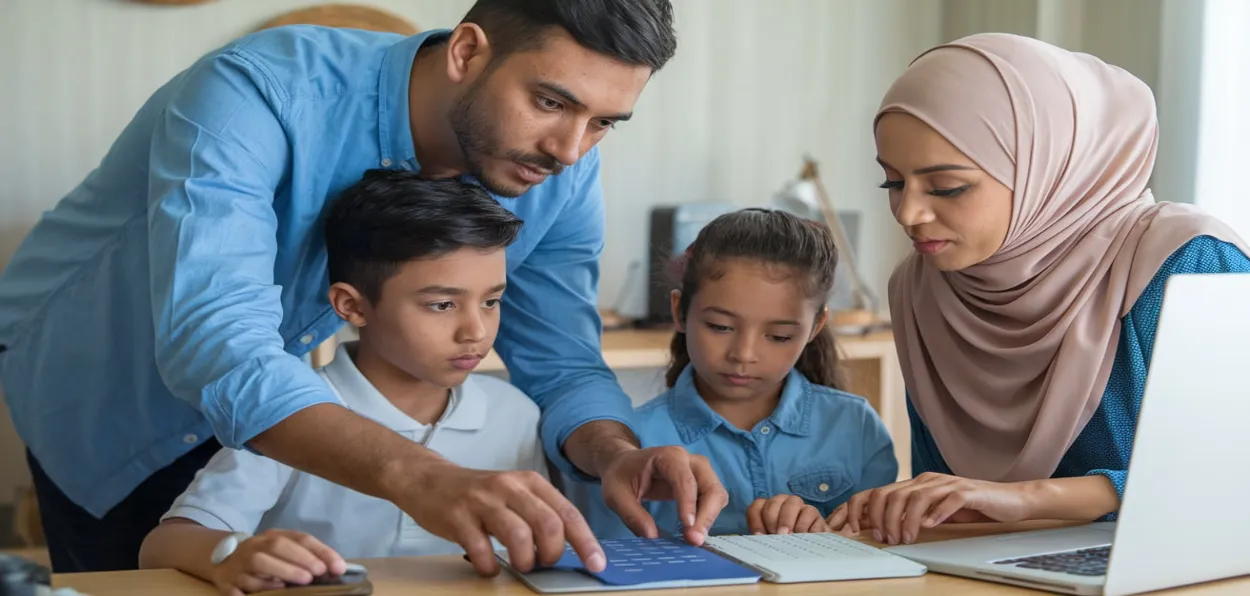
Eman Sakina
Educating children about how to use social networking sites safely is essential in today’s digital world. With the rapid rise in technology, children are exposed to online platforms at younger ages.
Friday Musings
It’s not just about how much time kids spend on these platforms, it’s also about what they are engaging in and with whom. Education about these tools is critical, and it should start early so that by the time they are using these platforms, they know about being safe.
Below is a guide on approaching children to tell them about making informed and positive choices online.
Understand the Basics of Social Networking
Before discussing social media with children, familiarize yourself with the popular platforms they use, like Instagram, TikTok, Snapchat, and others. Each platform has unique features, privacy settings, and content types, so knowing the basics can help you set specific guidelines.
Explain the Importance of Privacy and Security
Help children understand the importance of privacy online:
Personal Information: Teach them not to share personal details, such as their full name, address, phone number, school, or photos that reveal their location.
Passwords: Stress the importance of keeping passwords private, even from friends, and using strong, unique passwords for each account.
Privacy Settings: Guide them through the privacy settings on each app to control who can see their posts and communicate with them.
Encourage Responsible and Kind Online Behavior
Social media can be a powerful platform for connection, but it’s also a place where bullying and unkind behavior can occur. Here’s how to instill positive habits:
Empathy and Kindness: Remind them that words have power, and encourage them to treat others online as they would in person.
Avoiding Conflicts: Teach children not to engage in online arguments or comment wars, as these can quickly escalate and harm their emotional well-being.
Reporting Harmful Content: Show them how to report inappropriate or harmful content. Reassure them that they can always come to you if they feel uncomfortable or threatened online.
Help Them Develop Critical Thinking Skills
Social media is full of diverse content, some informative and some misleading. Equip children with skills to critically evaluate what they see:
Identifying Fake News: Explain that not everything they read online is true. Discuss the importance of checking sources before sharing information.
Understanding Advertising: Point out that many influencers or ads are trying to sell products, and they often show an unrealistic version of life.
Recognizing Peer Pressure: Talk about the pressures to gain likes, follows, or attention, and help them develop confidence in their values and interests.
Limit Screen Time and Encourage Balanced Usage
Social media can be consuming, so it’s important to help kids balance their online and offline lives.
Setting Boundaries: Establish screen time limits for social media and encourage activities like reading, sports, or spending time outdoors.
Digital Detox: Introduce the idea of regular breaks from social media, like “tech-free weekends” or “device-free dinners,” which can help children appreciate time away from screens.
Teach About Digital Footprints and Online Reputation
Kids often don’t realize that what they post online can have long-term consequences:
Permanent Posts: Explain that, even though some posts might seem temporary (like stories), screenshots or other users can keep them indefinitely.
Reputation Management: Encourage them to think carefully before posting anything. A good rule of thumb is: “If you wouldn’t want it seen by your teacher or grandparents, don’t post it.”
Be a Good Role Model
Children often mimic their parent's behaviour, so be mindful of how you use social media yourself:
Set an Example: Practice healthy screen time and online behaviour, including limiting the sharing of personal details. Show some good Islamic content and good teachings (based on the lives of Prophets) to them.
Family Tech Rules: Create tech rules that everyone in the household follows, like “no phones at the dinner table” or “screen-free Sundays.”
Foster Open Communication
Encourage open and honest conversations about social media. Let children know they can come to you with questions or concerns without fear of punishment.
Ask About Their Experience: Show genuine interest in what they see and do online.
Keep Up with Trends: Stay informed on new apps or social media trends to understand what they’re experiencing and stay ahead of potential risks.
Teaching children how to use social networking sites responsibly is an ongoing process that requires patience, consistency, and open dialogue. As parents and educators, we can equip them with the skills they need to navigate the digital world safely, responsibly, and positively. By instilling these habits early, children will grow up to become mindful, responsible digital citizens.
